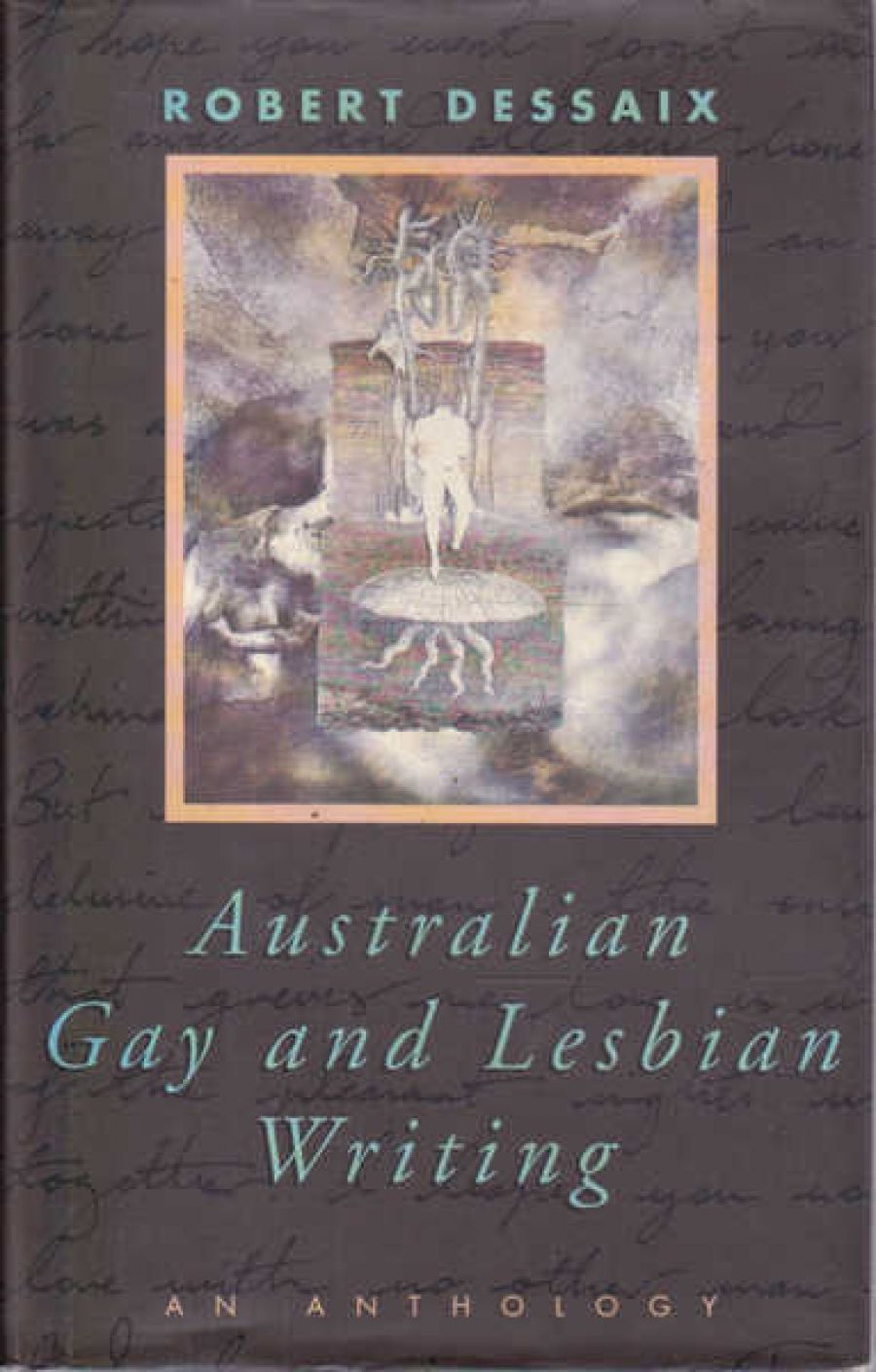
- Free Article: No
- Contents Category: Gay Studies
- Review Article: Yes
- Online Only: No
- Custom Highlight Text:
In the advertising world there’s a new and controversial trend towards catering for the X-Generation; that is, consumers with a two-second attention span, and we’re not just talking about teenagers on rollerblades.
- Book 1 Title: Australian Gay and Lesbian Writing: An Anthology
- Book 1 Biblio: OUP, $39.95 hb, 0195534573
Robert Dessaix has been very careful and consistent in a number of ways that might not suit everyone in these postcolonial, multicultural days. The whole of his introduction, bar the last page and a half, situates the Australian gay tradition within a white colonial history; from the microcosm of the convicts, through the homoerotic legends of the bushrangers and into the dramatic sexual awareness of the 1960s and beyond.
Even though much of this history concentrates on a male subculture, Dessaix acknowledges the radical influence of women writers on traditional narrative forms in the conclusion to his introduction:
… stylistically lesbian writers have proved much more adventurous, playful and subversive on the whole than male gay writers ... in some ways male writers simply seem to be writing fiction that is true to gender stereotypes: it is reportage … with a camp edge.
Thank goodness for some insight in a collection of work such as this, which manages to avoid focusing on, and glorifying, the emptiness and nastiness of a certain side of gay culture. Instead it roams equally over both the extremes and the subtle differences of same-sex attraction and actually illustrates those differences within the space of one publication.
Some of the writers included in this anthology have indeed inclined towards that tendency to glorify what basically boils down to mean, seedy, and sad, but the work represented here has been chosen to show this as only one part of gay life, paralleled by elements of humanity, poignancy and caring. Sasha Soldatow’s ‘Requiem’, for example, reveal how fine a line lies between hollow arbitrariness and the transformation between men that can occur within a transgressive love:
… he hands me a towel and touches me again. It is the touch of kindness. After I have washed I stand before him like an unprotected newborn child. He hugs me like a lover, then wipes my body dry of the tears of generations.
Although not all the contributors identify as gay or lesbian, they are almost without exception very Australian; largely born and bred here. So, too, the material collected could be identified as predominantly ‘literary’. Even writing originally considered quite alternative, such as that of Mary Fallon, Susan Hampton, and Soldatow, is writing that now has at least some stamp of approval from institutions and markets that mould our slippery sense of ‘ Australian literature’.
Still, this is no more or less than the title or the editor proffer and, even if this anthology has ‘university reading list’ stamped all over it, for once I dare not to care, possibly because it’s refreshing to find a book which makes for such superb reading from cover to cover.
Sections include ‘Desiring’, ‘Initiating’, ‘Transgressing’, and ‘Loving’, with a comment from the editor prefacing each one. There is a satisfying range of emotions and experiences throughout, from the lust and passion of Mary Fallon’s ‘Working Hot’, to the wry humour of ‘The Elocution of Benjamin J. Franklin’, the betrayal and cruelty in Nicholas Jose’s ‘A Game of Go’, and the shocking violence of Simon Payne’s ‘The Beat’.
There is also deep love and loyalty, and one of the most touching pieces is the less than literary, anonymous ‘A Convict’s Letter 1846’, which opens the anthology:
I hope you won’t forget me when I am far away and all my bones is mouldered away I have not closed an eye since I have lost sight of you your precious sight was always a welcome and loving charming spectacle.
Established writing mixes with new and alternative narratives; the result illuminates both. It’s good to see ‘old’ favourites recognised, such as the poems of Lesbia Harford or Elizabeth Riley’s All That False Instruction, similarly that of recent writers such as Tim Herbert and David Herkt. Whether you tend towards out-of-print paperbacks from the second-hand bookshop, the latest slim and shiny release from a trendy gay bookshop or local student publications, this way you can taste it all, from the nineteenth century to the approach of the new millennium.
One of the outstanding features of the anthology is that many familiar authors and poets are revealed in a new light, with the inclusion of material that veers from the work usually associated with them. Particularly memorable are the two haunting short stories by Henry Handel Richardson, and the reflective sadness and anguish of Thomas Shapcott’s poems, ‘Elegy for a Bachelor Uncle’ and ‘Young Men’s Bodies’.
No matter how widely read any individual might consider themselves, there will be writing here that will make you realise there’s always something missed, that we are constantly in danger of restricting our literary palates whether through habit or ennui. Would I have ever read Sumner Locke Elliot’s Fairyland, Dennis Altman’s The Comfort of Men, or Kate Walker’s teenage novel, Peter, if I hadn’t read this anthology? Now I will, and this response is one that many anthologies fail to provoke.
Dessaix has chosen extracts attentively and has made sure that the prose pieces are long enough to absorb the reader in each novel or story and to give a real sense of each writer’s strength. Thirty pages of Frank Moorhouse’s The Everlasting Secret Family had me flagging a little, but on the whole less contributors and more of the work of those included certainly achieved the editor’s ‘primary consideration ... pleasure for the reader’.


Comments powered by CComment